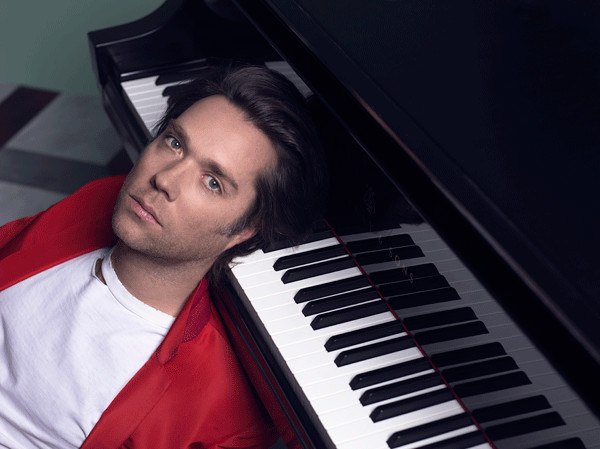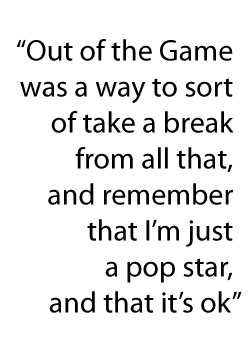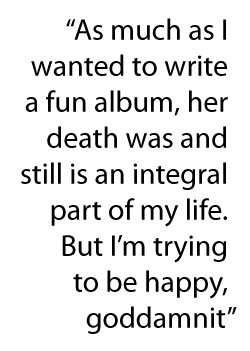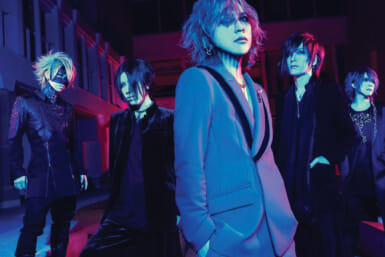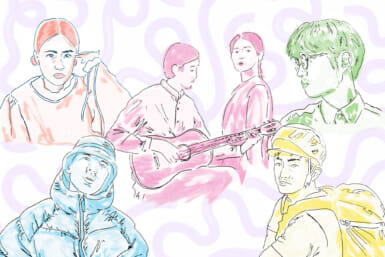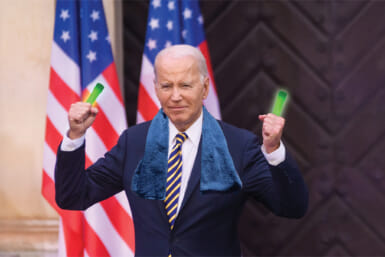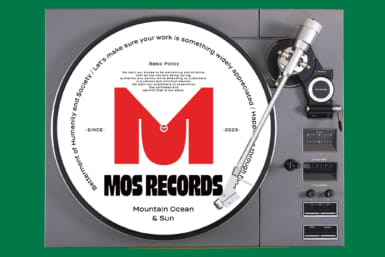For Rufus Wainwright, a night at the opera isn’t about class or high culture — it’s about trying to unwind.
by Kyle Mullin
“I write operas for relaxation,” Wainwright says sarcastically of the relatively static schedule in the theatre compared to his day job, touring as an alt-pop musician. He’s talking with Tokyo Weekender by phone in the lead up to his March 19 performance at Shibuya Public Hall and adds with another chuckle: “I’ve been on the road since I was 20, so when I write an opera, I get to stop and live in one place for a month, and finally see some of the beautiful homes I’ve bought over the years…”
“I’m joking, of course,” he adds, before clarifying: “When you are in the middle of dealing with directors, conductors and orchestras, operas become a whole other jungle of insanity. That being said, it’s so fulfilling in the end to sit in the audience, finally, and enjoy your own music.”
But Wainwright admits that it didn’t take him long to grow self conscious and start to mentally nitpick his 2009 debut opera, titled Prima Donna, from the front row. It’s part of his restless nature, which has surely helped him create some of the most unabashedly unconventional music of the past few decades — from the baroque pop of his self titled 1998 debut to the ecstatic eccentricity of 2003’s Want One and 2004’s Want Two (for which he posed on the cover as Lancelot, and then a gender-bent version of that famed knight’s lover Lady Shallott) and from his sonic adaption of Shakespearean sonnets on 2010’s All Days are Night: Songs for Lulu, to his latest, more pop-wise release, 2012’s Out of the Game.
Although Wainwright has spent most of his life traveling as a troubadour, he may now be ready to explore his operatic ambitions full time, with a follow up to Prima Donna on the way. That next curtain call will be written later this year and funded in part, he tells me, by his current Out of the Game solo tour. In a way that method of financing is ironic, because his latest disc is his first to borrow less from opera’s grandeur and more from Wainwrights’s other obsession — 70s soft rock.
“For me, Out of the Game was a way to take a vacation from the general darkness that could be found within my opera and the last record I made,” he says of Prima Donna and 2010’s All Days are Night: Songs for Lulu, adding that the latter’s sonnet songs and other Shakespearean ambitions grew weighty as he toured behind it. “Lulu felt like a very serious classical record, in my opinion. So Out of the Game was a way to sort of take a break from all that, and remember that I’m just a pop star, and that it’s ok.”
Part of that loosening up came courtesy of Mark Ronson, (the producer behind Amy Winehouse’s throwback masterpiece Back to Black), who helped give Wainwright’s latest effort a retro sheen worthy of the songwriter’s biggest pop influences — Billy Joel, David Bowie and Elton John.
“(Ronson’s) a very fun guy. And such a prince on every level — from princely attitude to princely look,” Wainwright says warmly of his latest collaborator, adding that their upbeat studio sessions were just the sort of distraction he needed: “It was a wonderful project in what was otherwise a very dark period. My mother had passed away, and I was feeling pretty low.”
His mother was Kate McGarrigle, who started a songwriting lineage by marrying fellow folk singer Loudon Wainwright III, then giving birth to Rufus in 1973 and his sister, would-be rip-roaring acoustic songstress Martha, in 1976.
The family’s relationship was tumultuous to say the least. Loudon and Kate divorced when Rufus was only three, and that separation brought no end to the family’s domestic upheaval. In an early interview Wainwright described coming out of the closet in his teens, and said his parents “could not even handle me being gay. We never talked about it really.”
That awkwardness occurred while McGarrigle was raising Rufus in her hometown of Montreal, Canada; during the youngster’s regular visits with his father, who was still forging a solo career in the US; and with stints at New York’s Millbrook boarding school, which Loudon hoped would straighten Rufus out in every sense of the word.
While his parents trifled over his sexuality, Rufus had more difficulty coming to terms with it, albeit for far darker reasons. At the age of 14, during an unsupervised evening in London while his father was gigging, Wainwright hooked up with a man in a bar. They took what promised to be a romantic stroll in nearby Hyde Park, but before long the stranger had raped and robbed the young, and no longer naïve, Rufus.
Wainwright captured the sonics of those hellish experiences on his self titled 1998 debut, which was critically acclaimed not only for its tender lyrics, but also for its piano and orchestral arrangements that swelled like bruises. Its success led to a photo shoot for Rolling Stone, together with his father. But what should have been a family milestone quickly turned into their most heated quarrel. The junior Wainwright went on to describe the incident in a 2005 interview with The Guardian, saying:
“I told him he must be really happy that I had got him back in that magazine after all these years. That sort of kicked things off. Later in the evening he threatened to kill me. So I went home and wrote Dinner at Eight as a vindictive retort to his threat.”
On the embittered tune (recorded for 2003’s Want One), Rufus sings, “Daddy, don’t be surprised if I wanna see the tears in your eyes.” Martha Wainwright went on to pen equally biting lyrics about their father on songs like Bloody Mother Fucking Asshole.
But part of the family’s reconciliation is in part due to that kind of frank songwriting. Loudon, for instance, cathartically confessed how his daughter’s “suntanned skin turned crimson” on the bitterly, but aptly titled Hitting You. Both Rufus and Martha feature on their dad’s latest disc, 2012’s Older Than My Old Man Now, singing “Forgive and forget, and finally see the forest from the family tree,” on the beautifully therapeutic ballad, All In a Family.
But even before those amends were made, Rufus often found himself dwelling on the frayed bonds he shared with his father. No instance of this could be truer than the months he spent partying in New York after the critical lauding of his self titled debut album. During one of many crystal meth binges, the junior Wainwright was struck by constant hallucinations that featured his father at the forefront. He described that turmoil in the same Guardian interview, saying:
“I realized suddenly just how unhappy I was… I believed I had two choices. I was either going to rehab or I was going to live with my father. I knew I needed an asshole to yell at me, and I felt he fitted the bill. I wanted to become him in some way.”
The near deadly excess that followed the success of his first album is bookended, in a way, by his latest disc, which nearly captures the wholesomeness of the influences he grew up listening to on ‘70s AM radio.
Having long since sobered up and ceased promiscuity, thanks in no small part to his partner, German arts administrator Jörn Weisbrodt, Wainwright found himself in need of rousing, swaggeringly sunny songs when the time to record Out of the Game came last year. And while Wainwright relished those latest uplifting recording sessions with Ronson as his producer, he also found himself mourning through a few songs on his own.
Candles is a gently subdued album closer that features Wainwright holding the notes he’s sung in a swelling hum, as if he were holding his breath against the heartache. That lyrical dedication to his mother culminates in the song’s last moments, especially the lines:
Turn one day in the cathedral
I finally lit you a candle
And all along the vaulted halls
The virgins did smile from their mantles
“I wrote that right after my mother died,” Wainwright tells me, adding that the doleful tune lingered long after, all the way to his first studio sessions with Ronson months later. “As much as I wanted to write a fun album, her death was and still is an integral part of my life. So I had to refer to it a few times, on it [Candles] and (the album’s midway track) Montauk. But I’m trying to be happy, goddamnit.”
He says that last sentence with another sly chuckle — one that doesn’t sound forced, but resigned. It’s a similar tone to that of the slow burning Montauk. On it, Wainwright refers to his mother as a “woman now a shadow, there she does wait for us in the ocean.” But the song has another, far younger muse. Wainwright spends the bulk of the tune singing about his now toddler daughter, Viva, being fully grown and fully embarrassed by her dad’s kimono and her “other dad’s” rose pruning. But there’s no angst or monotony in that notion of domesticity, because Wainwright is only now considering it for the first time.
“The idea of having a family didn’t occur to me for ages, because I was a diehard hedonist and a stylistic romantic when I started out,” Wainwright says of the unexpected turn his narrative has taken. The story of his newfound family life may be less dysfunctional, but it’s by no means lacking in plot twists.
Viva’s mother is none other than Lorca Cohen, daughter of esteemed Canadian songwriter Leonard Cohen and a childhood pal of Wainwright’s. As Rufus tended to his dying mother in 2010, Lorca looked on and felt her own biological clock counting down. When she asked Wainwright to father her child, he turned to McGarrigle for some maternal advice. She was not only supportive, but adamant. So Wainwright granted that dying wish, watched his daughter come into the world, and began drawing on the gut wrenching give-and-take of it all for lyrical inspiration.
“I’ve already written three songs about her, so something’s definitely happening,” he says, with cheeky euphemism, about the unique way that little Viva stirs his soul — be it from halfway around the world when he’s on tour, or face to face during one of his infrequent visits to the L.A. home where she and her mother reside. But that setup could all change soon enough should Wainwright decide to focus on writing operas instead of jet-setting pop divadom. He likely won’t sacrifice touring altogether, but adds: “I’m definitely going to start rearranging my life to accommodate this new guest in the house of Rufus.”
Parenthood may be offering him a fresh perspective, but it hasn’t left Wainwright clairvoyant by any means — especially when it comes to giving insights on, or forgiveness towards his father.
“I think it’s too early to really tell,” Rufus says of how caring for Viva might impact his ties with the elder Wainwright. “The only thing I know now about my daughter is that she’s wonderful, and that I’m really more in shock about it all than anything else. I mean, my dad and I worked hard over the years to rectify our grievances, and to a certain extent it really worked. But in the end, ya know… dads are dads, it’s as old as the hills.”
Whether it’s sharing dinner or performing shoulder to shoulder in the studio, Rufus finds himself not only at peace with his father, but also in awe of him — especially after collaborating on Loudon’s critically lauded Older Than My Old Man Now.
“My father is one of the great living legends, I feel, of the troubadour tradition,” Rufus says. “He really goes out there alone, like I’ll be doing in Japan, singing for his supper. He just goes from town to town entertaining folk, it’s an ancient tradition he really mastered and I admire that tremendously. He brought me up to have some sense of the fact that you’re only as good as what you can do physically with music, the songs you can sing or play. That’s really the core of the experience, and I’m really very fortunate to have that education.”
And now that Wainwright is nearing his 40s, he can’t help but ponder the best way to continue following in his father’s footsteps — to age gracefully, perform constantly, and stay healthy. In that way, the stresses of the road may be good for him, and enough to make him consider continuing the tricky balance between operas, daughters and pop songs.
“When I’m on tour, that’s when I’m healthiest,” he says, before describing how songs can continue to be his saving grace. “I am not an organized, or consistent, or steady kind of guy. But when you’re on the road, performing for people every night, you have to be. It forces you into that position.”
Kyle Mullin is a roaming rock journalist who has contributed to music mags around the world. You can read his interviews with Iggy Pop, David Byrne and St. Vincent, Brian Wilson and others at kylelawrence.wordpress.com He spoke with Japandroids for Tokyo Weekender in February this year.
Main Image is by Tina Tyrell

